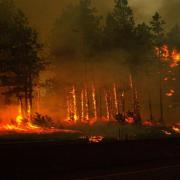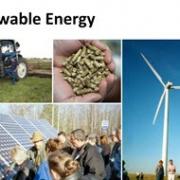Effects of Drought on Forests and Rangelands in the United States: A comprehensive science synthesis
Webinar Date: May 5, 2016
Dr. Jim Vose presents the key findings of the report Effects of Drought on Forests and Rangelands in the United States: A comprehensive science synthesis. Edited by Forest Service scientists in partnership with Duke University, the document provides a valuable new tool to inform discussion, planning and implementation of adaptation strategies for land managers and policy makers. The collaborative effort, authored by 77 scientists from the Forest Service, other Federal agencies, research institutions and universities across the United States, examines ways to understand and mitigate the effects of drought on forests and rangeland including the 193 million acres of National Forest System lands.
To view a recording of this webinar, click here.
Primary drivers of climate today and in the future – a primer for extension.
Webinar Date: April 7, 2016
Dr. Ryan Boyles is an applied climatologist and extension associate professor of atmospheric science at NC State University. He serves as the Director for the State Climate Office of North Carolina and as the University Director for the DOI SE Climate Science Center. Ryan explains some of the primary drivers for year-to-year variations in climate for North America and those that affect changes over decades and centuries.
To view a recording of this webinar, click here.
Monitoring, Assessment, and Engagement to Sustain Forest Benefits in a Changing Climate
Webinar Date: March 3, 2016
Sara Workman and Bill Christie present climate change tools available through the Eastern Forest Environmental Threat Assessment Center. The Center partners with government agencies, universities, and nongovernmental organizations to improve the collective national capacity to predict, detect, monitor and assess threats to forest, range and wildlands. It addresses problems related to the science of monitoring, assessment, and communication across four primary classes of environmental threats: forest pests, weather and climate change, wildland fire, and changes in land use or land cover. Center scientists and partners address emerging issues and collaborate to create tools and resources related to forest ecosystems, water quality, biodiversity, and wildfires—all within the context of changing climate, increasing human populations, and dynamic socioeconomic conditions. The Center strives to address critical broad-scale management needs across all four threat areas, and its research focuses on resource managers’ needs for monitoring their occurrence, interpreting their extent and implications, predicting their likely impact, and sharing results, technology, and resources with affected organizations and individuals. See more at http://www.forestthreats.org/
To view a recording of this webinar, click here.
Extension Programs in Renewable Energy
Webinar Date: February 4, 2016
Janet Nagele begins by discussing the renewable energy education program which began five years ago in Oregon. The focus of the program is energy literacy with youth. There are 14 lessons put together with a student engagement design. These materials are all available through the web-link listed below. Mary Wrege follows with an explanation of her work in agricultural energy efficiency. She works mainly with dairy farms and her initiative has been to encourage the use of renewable thermal energy for heating water. She explains the E3A Energy Action Pyramid for Home, Farm and Ranch. For some dairy farms water heating can account for 25% of their total energy usage. Thermal energy is being used for cleaning milking systems to radiant floor installations for calf barns. Mary explains the solar thermal demonstration unit she uses in her energy education program.
To view a recording of this webinar, click here.
Forests, Fire and Climate
Webinar Date: January 7, 2016
Penny Morgan, Professor in the Dept. of Forest, Rangeland, and Fire Sciences at the University of Idaho, discusses the interaction of the changing
climate and forests and fires. She shares climate change trends happening in Idaho and shares several interesting websites, such as the University of
Idaho Fire Severity Mapping System Project. Statistics are shared that show that dry summers followed by warm springs leads to more severe
fire seasons. She demonstrates that communications about fire and fire management strategies are important given the current climate projections.
To view a recording of this webinar, click here.
Renewable Energy and Energy Efficiency efforts in Minnesota
Webinar Date: December 3, 2015
Joel Haskard begins the discussion by talking about renewable energy and energy efficiency efforts in Minnesota. He shares various methods they have used to help people save money and energy and some very interesting program marketing ideas based on behavior change science. David Liebl and Dr. Shiba Kar introduce the process used to develop a UW-Extension climate change strategy, including a UW-Extension Colleague Survey climate change programming needs assessment. Climate change resources for extension educators being developed in Wisconsin are explained and shared.
To view a recording of this webinar, click here.
Resilient Change and Measuring Hope
Webinar Date: November 5, 2015
Molly Woloszyn, climate specialist with University of Illinois Extension, begins the discussion by talking about Resilient Chicago Initiative. This program helps decision makers in the greater Chicago metropolitan region to incorporate climate adaptation into local planning efforts. She explains the partners and climate change workshops she has offered since the program began in the fall of 2014. She also explains the NOAA Quarterly Climate Impacts and Outlook Reports and El Nino Reports. Dr. Martha Monroe, Professor and Extension Specialist at the School of Forest Resources and Conservation at the University of Florida then explains that teaching just the knowledge of climate change can lead to a feeling of helplessness especially among young people. She offers an alternative to teaching climate change which builds hope and resilience. Christine Jie Li, Ph.D candidate in the School of Forest Resources and Conservation at University of Florida, then explains an evaluation research study involving 900 high school students from 28 schools, measuring whether climate change activities can nurture hope.
To view a recording of this webinar, click here.
Lessons from the Field: Montana Climate Extension
Webinar Date: September 3, 2015
Dr. Fabian Menalled, Professor, Weed Ecology and Management, Montana State University, begins the discussion by talking about how he is addressing the issue of communicating climate change and bridging the gap between citizens and scientists. He has organized the dialogue based on Montana climate data and the question, “Is cheatgrass becoming more difficult to manage.” Dr. Paul Lachapelle, Associate Professor and Extension Community Development Specialist, Department of Political Science, Montana State University-Bozeman, follows by discussing how Montana State University Extension has addressed climate change education, even producing a “Climate Science Program Framework” document. He also introduces the Bozeman Extension Climate Science Conference to be held December 8-10, 2015, in Montana.
To view a recording of this webinar, click here.
